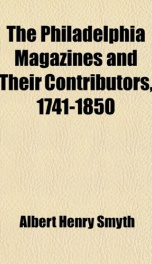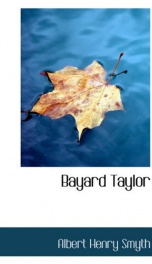The Philadelphia Magazines and their Contributors 1741-1850

Purchase of this book includes free trial access to www.million-books.com where you can read more than a million books for free. This is an OCR edition with typos. Excerpt from book: INTRODUCTION. To relate the history of the Philadelphia magazines is to tell the story of Philadelphia literature. The story is not a stately nor a splendid one, but it is exceedingly instructive. It helps to exhibit the process of American literature as an evolution, and it illustrates perilous and important chapters in American history. For a hundred years Pennsylvania was the seat of the ripest culture in America. The best libraries were to be found here, and the earliest and choicest reprints of Latin and English classics were made here. James Logan, a man of gentle nature and a scholar of rare attainments, had gathered at Stenton a library that comprehended books " so scarce that neither price nor prayers could purchase them." John Davis, the satirical English traveller, who said of Princeton that it was "a place more famous for its college than its learning," did justice, despite of his own nature, to Logan and to Philadelphia when he wrote: " The Greek and Roman authors, forgotten on their native banks of the Ilissus and Tiber, delight by the kindness of a Logan the votaries to learning on those of the Delaware!' The eagerness of Philadelphia social circles for each new thing in literature enabled booksellers to import large supplies from England and to undertake splendid editions of notable books. Dr. Johnson was made to feel amiable for a moment toward America on being presented with a copy of Rasselas bearing a Philadelphia imprint. The first American editions of Shakespeare and of Milton, of "Pamela" and of "The Vicar of Wakefield" were printed in Philadelphia.' In the same city, in 1805, Aristotle's " Ethics " and " Politics " were published for the first time in America. A little later came the costly " Columbiad " and the great volumes of Alexander Wilson. ...
Info about the book
Author:
Series:
Unknown
ASIN:
B0082RDF3C
Rating:
3.5/5 (2)Your rating:
0/5
Languge:
English
Users who have this book
Users who want this book
What readers are saying
What do you think? Write your own comment on this book!
write a commentif you like The Philadelphia Magazines and their Contributors 1741-1850 try:
Other books by this author
Do you want to read a book that interests you? It’s EASY!
Create an account and send a request for reading to other users on the Webpage of the book!



